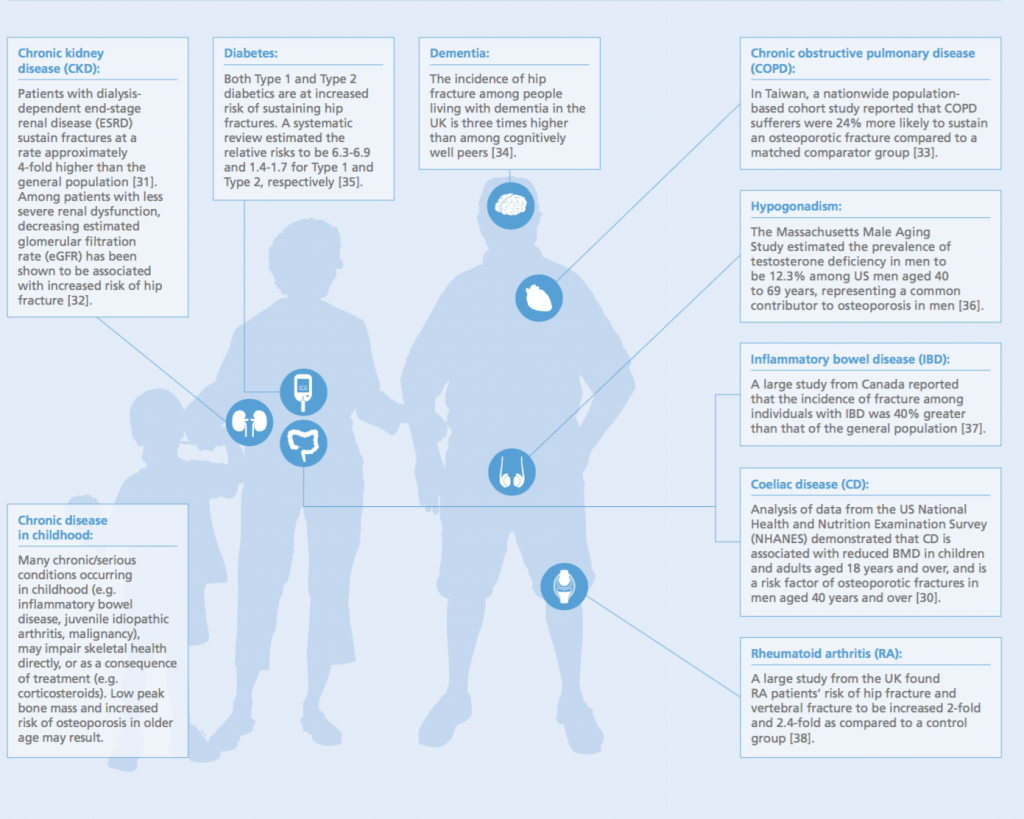Many people think osteoporosis is linked to old age – the older we get, the more chance we have of developing osteoporosis. While this is true in some ways, age isn’t the only factor involved, and osteoporosis is linked to various other medical conditions, some of which might be surprising. Whilst certain people will develop osteoporosis simply because of these conditions, individuals must be aware of the increased risk and how other diseases are connected to osteoporosis. Dr Taher Mahmud of the London Osteoporosis Clinic explains more.
Rheumatoid arthritis
Rheumatoid arthritis is an autoimmune disease, meaning the body attacks its cells and tissues. Osteoporosis and rheumatoid arthritis are closely linked, and RA can cause several in several ways. Rheumatoid arthritis has no cure and is currently treated through management of the symptoms. Chronic inflammation over time affects the body, accelerating bone loss, as do drugs used to control the inflammation. Everybody loses bone mass over time, but rheumatoid arthritis speeds up the process and contributes to bone damage, increasing the fracture risk.
Inflammatory bowel disease & coeliac disease
Inflammatory bowel disease, or IBD, describes a group of intestinal disorders that cause digestive tract inflammation. Coeliac disease is a digestive condition in which the small intestine cannot absorb nutrients correctly, caused by an adverse reaction to gluten. IBD and other gastrointestinal diseases have been linked to osteoporosis through nutritional factors (calcium, vitamin D, and other minerals may not be as high as in those with no intestinal disorder), corticosteroid use over time, and long-term inflammation.
Diabetes
Diabetes is linked to many medical conditions and illnesses, including osteoporosis. Type 1 diabetes is linked to low bone density and difficulty reaching ideal bone mass. Our bones grow and get stronger until they reach their peak bone mass, so if this is low, patients have a greater chance of developing osteoporosis or experiencing a fracture. Diabetes is also associated with being overweight, contributing to osteoporosis and fracture risk. Diabetes patients must get the correct nutrition and exercise regularly to reduce the risk of osteoporosis and other medical conditions linked with diabetes.
Dementia
Both dementia and osteoporosis are commonly seen conditions in those with old age, but the two are also connected. Those who have dementia run a significantly higher risk of hip fracture than those who have no cognitive disorder. Many factors increase the risk of hip fracture, but falls are more common in those with dementia – particularly multiple falls. In those with dementia, the correct care and attention are crucial and can help patients reduce the risk of fracture.
Chronic kidney disease
Chronic kidney disease, or CKD, describes the gradual loss of kidney function and is associated with bone disorders and an increased fracture risk. In those with CKD, fractures in elderly patients are twice as common as those with normal kidney function.
Hypogonadism
Hypogonadism refers to the decreased function of the gonads, which in men are the testes and the ovaries in women. This means less oestrogen or testosterone is produced, or production is deficient. Oestrogen deficiency is connected with osteoporosis – menopausal women have been proven to be more at risk – and some studies have shown a relationship between testosterone levels and bone density.
COPD (Chronic Obstructive Pulmonary Disease)
Progressive lung diseases such as chronic bronchitis and emphysema fall under COPD, a term that describes various inflammatory airway diseases. Reports have shown that low bone mineral density is prevalent in those with COPD, reduced physical activity, and vitamin D insufficiency/deficiency, increasing the risk of osteoporosis and osteoporotic fracture. In those with COPD, screening is recommended as a routine procedure for earlier diagnosis of osteoporosis and appropriate treatment.
Chronic conditions in childhood
Some of the above conditions can also occur in childhood, such as inflammatory bowel disease and diabetes. Other chronic conditions such as juvenile arthritis also increase the risk of osteoporosis, either through impact on skeletal health or inability to achieve ideal peak bone mass.
Please get in touch with our office if you have a question.



One Comment